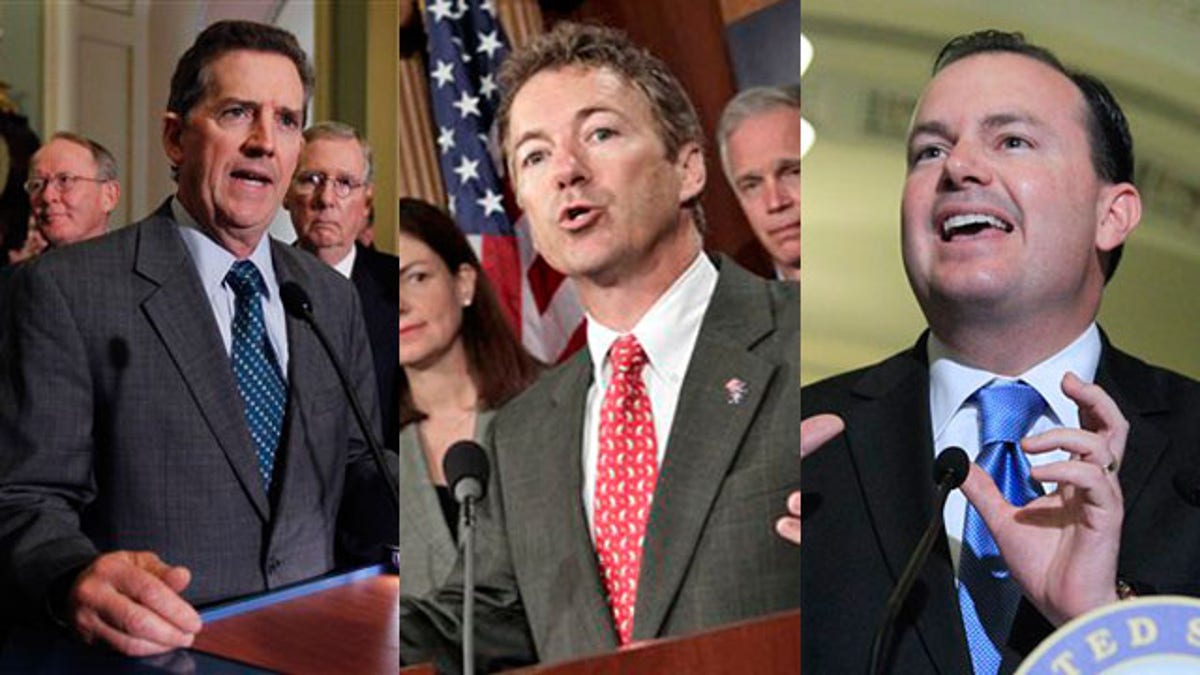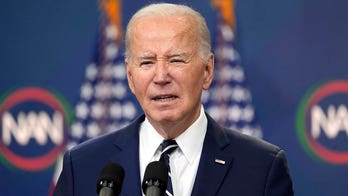
Shown here are Sens. Jim DeMint, left; Rand Paul, center; and Mike Lee. (AP)
With the economic recovery on life support, three Tea Party-backed senators are betting on gold to reverse the nation's fortunes.
Republican Sens. Jim DeMint of South Carolina, Rand Paul of Kentucky and Mike Lee of Utah unveiled legislation Tuesday that would keep Uncle Sam's hands off of gold and silver coins that have been declared legal tender by the government.
The Sound Money Promotion Act comes after Utah became the first state to recognize those coins as legal currency and exempted the sale of gold from the state capital gains tax.
The U.S. Senate legislation simply states that "gold and silver coins declared legal tender by the federal government or any state government shall not be subject to taxation."
"Thanks to the government's reckless over-spending, continued bailouts, and the Federal Reserve's easy money policy, this year the purchasing power of the dollar hit an all-time low in the several decades since we went off the gold standard," DeMint said. "In order to rebuild strength and confidence in our economy, we need both the fiscal discipline to cut wasteful spending and the monetary discipline to restrain further destructive monetizing of our debt. This legislation would encourage wider adoption of sound money measures, and that's a step in the right direction."
Twelve other states have considered following Utah's lead: Colorado, Georgia, Montana, Missouri, Indiana, Iowa, New Hampshire, Oklahoma, South Carolina, Tennessee, Vermont and Washington.
Gary Burtless, an economist with the Brookings Institution, said that the proposal could simplify the use of gold coins if they ever become an alternative to paper currency. That's because every transaction using gold coins would require a capital gains calculation since the value of gold is tied to the international trade, not the face value of the coin.
For example, if you buy a $100 gold coin and the value of gold rises by 20 percent over a six-month period, then you can exchange that coin for goods and services 20 percent greater than $100 and not worry about paying a capital gains tax.
But Burtless said the proposal is bad tax policy.
"It's hard to understand why gold should get this privileged position relative to silver, platinum, relative to any other material or property. It doesn't make sense," he said.
The U.S. used a version of the gold standard from 1873 until 1933, when President Franklin D. Roosevelt outlawed the private ownership of gold amid the Great Depression. But the U.S. returned to a different version of it in 1945 when an international monetary system of fixed exchange rates was created. President Richard Nixon abandoned the gold standard altogether when he announced in 1971 that the U.S. would no longer convert dollars to gold at a fixed value.
Critics of the gold standard say it limits countries' control over its monetary policy and leaves them vulnerable to financial shocks, such as the Great Depression. But supporters argue that the current financial system's dependence on the Federal Reserve exposes the value of U.S. money to the risk of runaway inflation.
The Senate proposal amounts to nothing more than a symbolic gesture since it has virtually no chance of passing in the Democrat-controlled upper chamber.
Lee, the Utah senator, claims the dollar has lost approximately 98 percent of its value since the Federal Reserve Act of 1913.
"This bill is an important step towards a stable and sound currency whose value is protected from the Fed's printing press," Lee said.
Paul blasted the federal government and Federal Reserve for monetizing the debt and inflating the currency.
"These implications can be devastating, leading to higher interest rates, which lead to higher borrowing costs and slower economic growth, but most importantly, destroying the savings and standard-of-living of all Americans," he said. "This bill will hold politicians and the Federal Reserve accountable; acknowledging that states are serious about an alternative to a weakening dollar."
Jeffrey Bell, policy director at American Principles in Action and head of its Gold Standard 2012 project, praised the senators for their legislation.
"These senators have taken an important step toward fixing our broken monetary policy," said Bell, who served as an issues adviser in Ronald Reagan's 1976 and 1980 presidential campaigns.
"By encouraging gold and silver coins to be used as money by the states, they are allowing them to send Washington a strong message of no confidence in the paper dollar system."
But Burtless says the message won't resonate with most people because they're not familiar with the historical debate on the use of the gold standard.
"It's the type of thing economists like to debate because it means we can justify the existence of our profession," he said.




